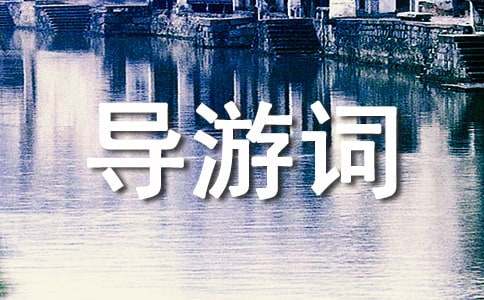都江堰英文導(dǎo)游詞
The Dujiangyan Dam, 45km north of Chengdu, is an ancient technological wonder of the country. More than 2000 yers ago, Li Bing(250-200BC), as a local governor of the Shu State, designed this water control and irrigation dam and organized thousands of local people to complete the project to check the Mingjiang River.For many years the river,flooded the Chengdu agricultural area and local farmers suffered a lot from the water disaster. Due to the success of the project, the dam automatically diverts the Mingjiang River and channels it into irrigation canals. For many years the dam has continued to make the most of the water conservancy works.

Expansion has been undertaken since 1949 and at present the system does a good job of irrigating farming land across 33counties of the western part of Sichuan Province. Local people feel proud of the system becaude it has supported a large amount of people in their daily life.
What makes this system so good?
The system is a large hydraulic water project which consists of three main parts: the Fish Mouth Water-Dividing Dam, the Flying Sand Fence, and the Bottle-Neck Channel.
The Fish mouth functions to divide the flow of water into an inner river and an outer river. Long ago, when Li Bing worked as the local governor of the Shu State, he found the old river canal was too narrow to hold much water, which often overflowed the banks and caused disastrous flood. Based on natural geographic conditions, he organized the people to build a man-made dam. The whole dam looks like a fish, and the front dam has a circular cone shaped like a fish mouth. It is the dam that channels water into an outer canal and an inner canal. The outer water canal functions as the main stream and holds sixty percent of water in the river. The extra water goes through the inner canal for irrigation in Chengdu areas.
The Flying Sand Fence joins the inner and outer canals. The fence functions to controll the flow of water and discharge excess into the inner canal from the main stream. During the dry season the fence doesn't work much, but when floods occur, the river rushes forward along the outer canal. As it approaches the fence, the fence,the river begins to turn round fast and soon many whirlpools are formed. The volatile whirlpools sweep away sand and pebbles and, throw them into the outer canal. For many years huge bamboo baskets were used as the fence. They were filled with stones and pebbles. However,at present, reinforced concrete weir has replaced the ancient fence.
So now, let's discuss the Bottle-Neck Channel. A trunk canal was cut through the mountain into two parts which link up the inner canal for irrigation. The small part is later called Li Dui, which means an isolated hill. Chengdu looks like a large bottle and the trunk canal between the mountain and the hill takes shape of the bottleneck. The trunk canal technically has two functions: First, it leads the water to irrigate the farming land in western Sichujan; Secondly, the trunk casnal works together with the Flying Sand Weir to keep the flow below a certain point in the inner canal during flood season. Some stone tablets, which stand on the isolated hill, are engraved in Buddhist Sanskrit. The local people hope that the Buddhist tablets can exert the Buddhist superpower to harness flood disaster. For over two thousand years, in fact, the Fish Mouth Water-Dividing Dam, the Flying Sand Weir, and the Bottle-neck Channel automatically work together to control foods and sweep away sand and stones in the main stram. The local people benefit a lot from this project.
Not far from the Dujiang Dam, a Daoist temple complex was wrwcted was erected to commemorate the benevolent rule of Li Bing and his son who succeeded him. Li Bing and his son were granted the posthumous title of Wang. The folk story says that July 24of the Chinese Lunar Calendar is Li Bing' birthday. On the day many local people visit the temple where they prostrate themselges before the image of Li Bing and his son and burn incense to honor them. The larger-than-life painted statues of father and son overlook the rushing river below. Nearby a stone tablet os engraved with a famous six-character quotation from Li Bing,"when the river flows in zigzags, cut a straight channel. When the riverbeb is wide and shallow, dig it deeper." The temple which is built near the mountaintop, is a popular stopping place for sightseers. There one can enjoy a unique view of the most modern parts of the water conservation project.
【都江堰英文導(dǎo)游詞】相關(guān)文章:
都江堰導(dǎo)游詞(15篇)01-06
都江堰景區(qū)導(dǎo)游詞3篇-四川導(dǎo)游詞12-31
都江堰魚嘴導(dǎo)游詞3篇-四川導(dǎo)游詞12-31
北戴河英文專業(yè)導(dǎo)游詞08-18
開平碉樓導(dǎo)游詞(英文)10-30
故宮英文導(dǎo)游詞精選10-29
西雙版納英文導(dǎo)游詞10-29
海南旅游英文導(dǎo)游詞11-04
巴黎導(dǎo)游詞英文3篇01-21